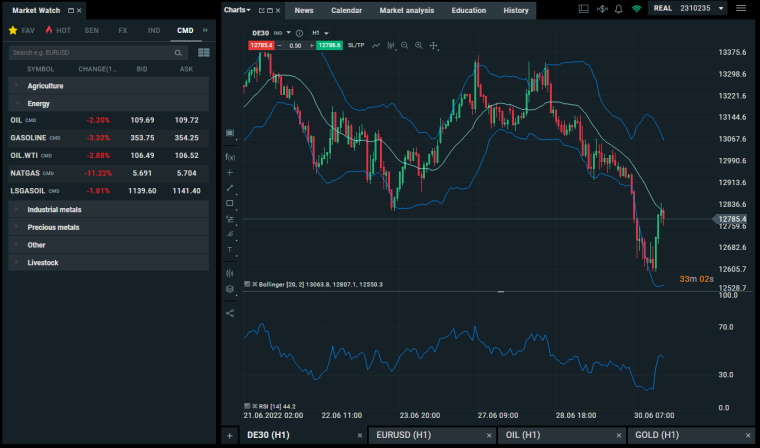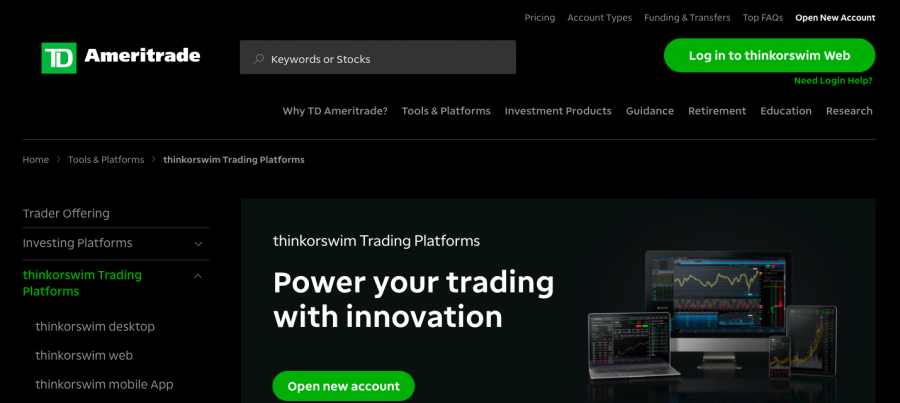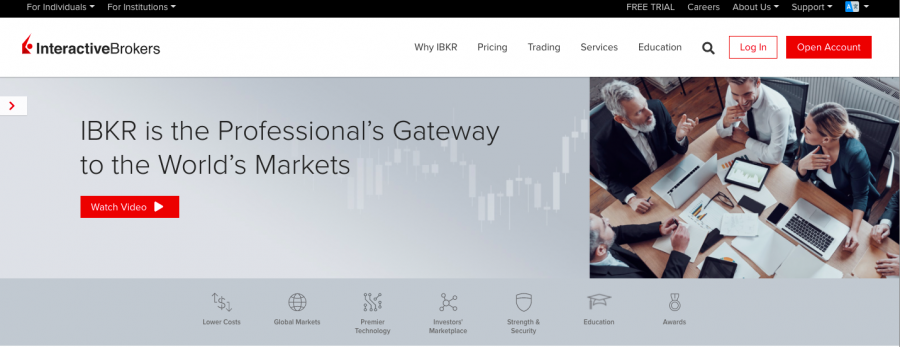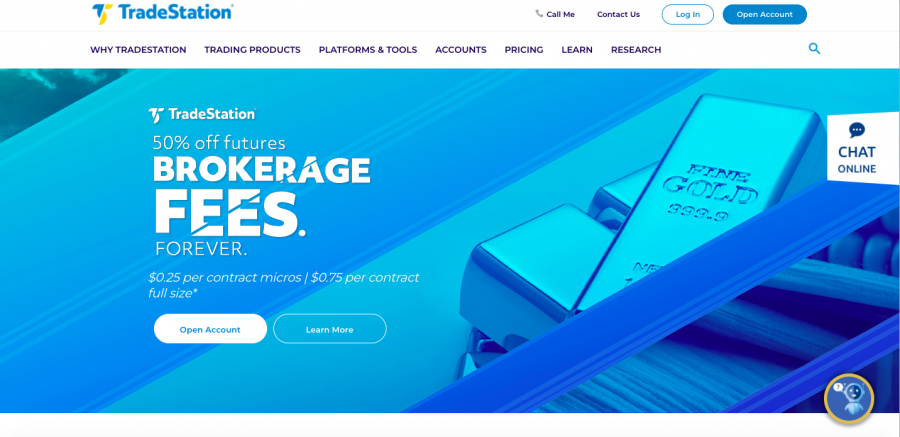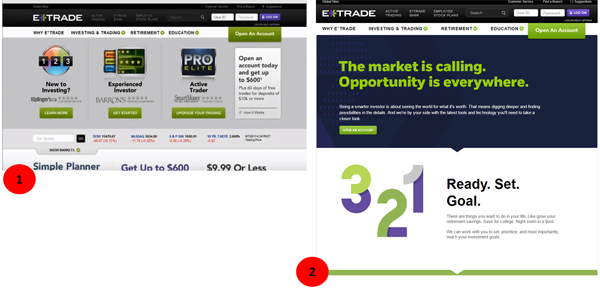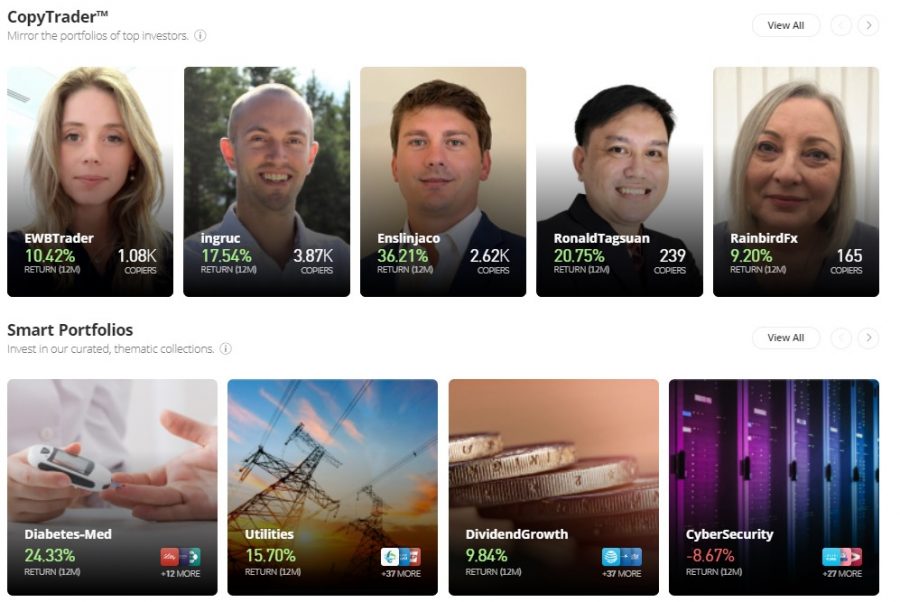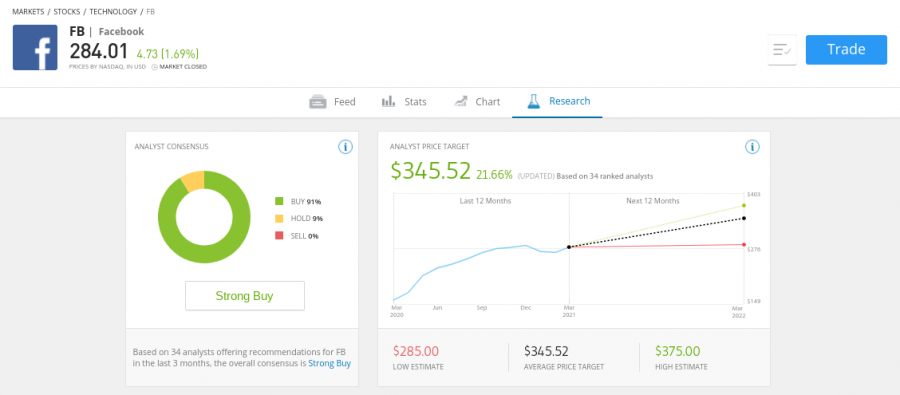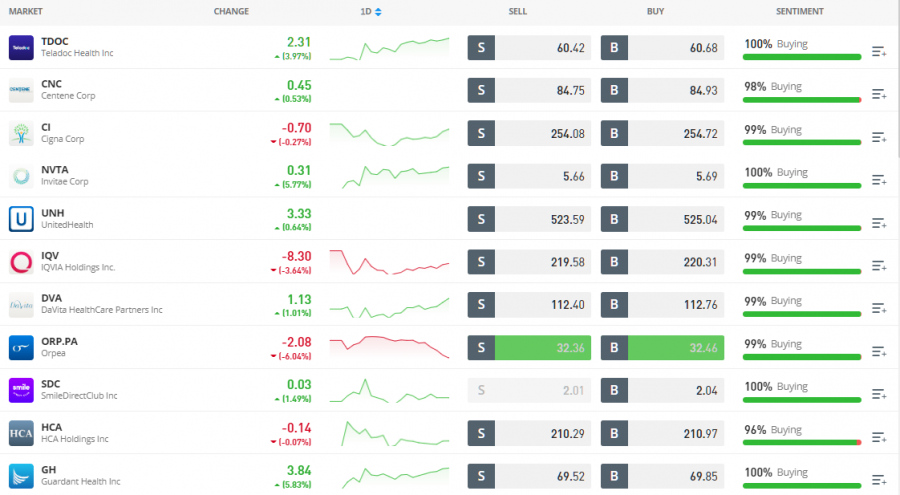Paper trading platforms are virtual market environments that allow investors to trade financial instruments in a risk-free manner. This guide provides a review of the most popular paper trading platforms and strategies for new and experienced traders.
We will also summarize the benefits of paper trading simulators and show you how to start investing using the paper trading app below.
Most Popular Paper Trading Platforms Ranked
We have ranked the 8 most popular paper trading accounts below. Scroll down to read the in-depth reviews of each paper trading platform.
- Webull – Paper Trading via Mobile App
- Plus500 – Futures Trading on Over 50 Futures Contracts
- XTB – Paper Trading on 2,100+ Markets with No Deposit
- TD Ameritrade – Test Advanced Strategies on your Paper Trading Account
- Interactive Brokers – Paper Trading Platform for Accessing Global Markets
- Tradestation – Back-Test on Stocks, Futures & Options
- Etrade – Paper Trading Platform to Learn Technical Strategies
- TradingView – Paper Trading Platform to Practice Day-Trading
Most Popular Paper Trading Platforms Reviewed
There are various factors to consider while ranking the most popular paper trading platforms. For example, the amount of funds and the mirroring of live activities in your demo accounts can differ per platform. The paper trading sites also provide access to international markets and multiple asset classes.
Considering all these factors, here are the most popular paper trading platforms currently available on the market.
1. Webull – Paper Trading via Mobile App
With mobile apps proving to be the new norm for online brokerages, many paper trading platforms can be accessed on iOS and
If you are based in the US and looking for the most popular paper trading stock app.
After researching the Webull website, we found out that Webull gives customers a pre-loaded allowance of $1 million on the demo mode. You can invest in U.S stocks, cryptos, ETFs, and penny stocks with your virtual funds.
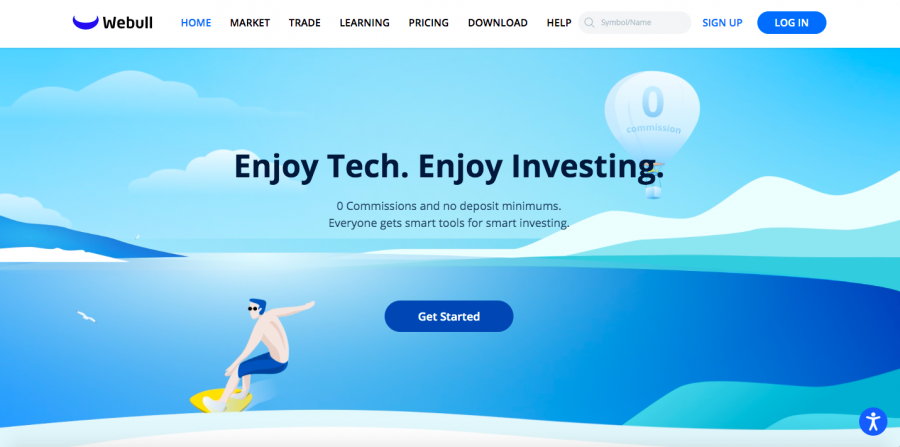
Although Webull takes no commission on stock options, other fees do apply. A monthly charge of $1 is solicited on your standard account.
Most importantly, Webull does not charge any broker fees on deposits. The $1 monthly charge can be covered by accessing the Webull promotional scheme. After successfully opening an account, Webull offers free shares of stock valued between $2.50 to $250.
If you invest a minimum of $100, the value of free shares goes up to $8 to $1600. You can claim this after buying stocks via credit card or the multiple other payment methods Webull offer.
| Paper Trading Features on Webull | |
| Demo Account Amount | $1 million |
| Asset Classes | U.S Stocks and ETFs, Cryptocurrencies |
| Top-up | 100% top-up available |
Cryptoassets are a highly volatile unregulated investment product.
2. Plus500 – Futures Trading With a $40,000 Demo Account on Over 50 Futures Contracts
Plus500 is a popular futures trading platform as it offers its clients up to $40,000 in virtual funds to trade over 50 futures contracts, including crypto, agriculture, metals, forex, interest rates, energy, and equity index. This is an excellent way to familiarize yourself with Plus500’s trading platforms – Web Trader and a mobile app – but also to test new trading strategies and improve your skills.
If you like the platform, open a real money account. You can deposit funds with no deposit and withdrawal fees, and you can start trading right away. There are low commissions on the contracts, while Plus500 charges Standard & E-Mini contract commissions, Micro contract commissions, and a Liquidation fee per contract. There are also no routing fees.
The minimum deposit is $100.
Plus500 is a regulated and licensed platform in several countries – Cunningham Commodities, LLC d/b/a Plus500, a Futures Commission Merchant registered with the US Commodity Futures Trading Commission and a member of the National Futures Association (NFA ID number 0001398), and is listed on the London Stock Exchange. Over 25 million users worldwide have entrusted their funds with Plus500.
| Demo Account Amount | $40,000 |
| Pricing System | low commissions |
| Futures Asset Classes | crypto, agriculture, metals, forex, interest rates, energy, and equity index |
| Min Deposit | $100 |
| Top-up | Yes |
Trading with leverage comes with a high risk and may not be suitable for everyone.
3. XTB – Paper Trading on 2,100 Markets with No Deposit

XTB doesn’t require a minimum deposit to open a new account, which makes its paper trading account one of the most accessible options available. The demo account can be reset at any time and offers access to all of XTB’s markets and trading tools. It’s a suitable option for traders who are using CFDs for the first time or who are interested in using XTB to access new markets to trade.
This broker has its own custom trading platform called xStation 5, which is available for the web and mobile devices. It’s packed with advanced charting tools and technical studies, plus offers handy tools like price alerts. Traders can use XTB’s paper trading account to test out new technical trading strategies in xStation 5.
| Paper Trading Features on XTB | |
| Demo Account Amount | $100K |
| Asset Classes | Stocks, ETFs, Cryptocurrencies, Index Funds, Forex, Commodities |
| Top-up | Reset anytime |
Your capital is at risk. 76% of traders lose money when trading CFDs with this provider.
4. TD Ameritrade – Test Advanced Strategies on your Paper Trading Account
With over 11 million registered users, TD Ameritrade allows you to access advanced paper trading strategies via desktop, online
TD Ameritrade has advanced web-based software – thinkorswim. The thinkorswim software gives you access to customisable trading tools to test out strategies and execute complex trades.
Notably, the thinkorswim paper trading platform provides users with $100K pre-loaded on their demo accounts. The thinkorswim paper trading software is for those looking to trade in the equities and derivatives market with access to essential tools and features.
If you decide to access the normal mode, TD Ameritrade will not charge you any trading commission on US stocks and ETFs either. The only drawback is that users have to deposit $500 to access real-time pricing quotes.
| Paper Trading Features on TD Ameritrade | |
| Demo Account Amount | $100K |
| Asset Classes | US stocks and ETFs, Futures & Options |
| Top-up | You can adjust and reset all positions and funds |
5. Interactive Brokers – Paper Trading Platform for Accessing Global Markets
Interactive Brokers is a comprehensive trading platform that gives users access to a massive range of securities at affordable
You can buy assets worldwide by accessing any of the 135 global markets available on Interactive Brokers.
The platform offers a wide variety of specialised tools to read charts and perform technical analysis – most of which are available on the paper trading app as well. Crucially, you can use Interactive Brokers to practice investing in a variety of long-term investments – including Futures, Forex, ETFs, index funds and options paper trading.
Interactive Brokers provides commission-free trading on all U.S stocks if you choose to access the normal mode. Join the Interactive Brokers paper trading simulator to access a pre-loaded amount of $1 million.
| Paper Trading Features on Interactive Brokers | |
| Demo Account Amount | $1 million |
| Asset Classes | Forex, Futures, Index Funds and Stocks |
| Top-up | Reset option to allow top-up to $1 million |
6. TradeStation – Back-Test on Stocks, Futures & Options
TradeStation traditionally focuses on experienced and active traders due to its robust platform that provides sophisticated charting and testing options.
However, beginners and active traders can use TradeStation’s simulated trading feature to practice their strategies.
Firstly, the platform provides an unlimited deposit on the free paper trading simulator. Secondly, TradeStation offers a unique feature on the paper trading account – Back-testing. This feature allows users to test the viability of a trading strategy by comparing their model with historical analysis.
Experienced traders can use the trade simulation to test out more advanced tactics – Strategy automation, advanced orders and alternate market types. With the unlimited deposit balance, users can access real-time market data to invest in Options, Futures, Stocks and ETFs.
If you choose to upgrade to a standard account, options and futures can be accessed starting from $0.50 and $1.50, respectively.
| Paper Trading Features on TradeStation | |
| Demo Account Amount | Unlimited Deposit |
| Asset Classes | Stock options, Futures and ETFs |
| Top-up | Unlimited balance and Top-up |
7. Etrade – Paper Trading Platform to Learn Technical Strategies
Etrade is an online trading platform that provides convenient tools and features to spot market opportunities.
Users can access the intuitive paper trading platform to test drive their stock and margin trading ideas through the Power Etrade app and website.
Through the Etrade paper trading options, you can learn how to use interactive charts and access over 100 technical studies and scans to hone your craft. From simple translations of industry jargon to viewing market movements – the Etrade paper trading app is simple and effective.
Without investing any of your real money, users can test out equities and option trading strategies with a pre-loaded $200K deposit. You are also given an additional $100K of virtual deposits for stocks and ETFs trading.
| Paper Trading Features on Etrade | |
| Demo Account Amount | $200K for equities + $100K for ETFs |
| Asset Classes | Stocks, ETFs and options trading |
| Top-up | 100% Top-up |
8. TradingView – Paper Trading Platform to Practice Day-Trading
TradingView is a powerful online trading platform that provides a free paper trading simulator option.
Catering to novice and experienced investors, TradingView provides technical analysis tools and superior charting systems to help in day-to-day trading. The paper trading demo platform of TradingView provides everything that your real money account would.
Charts and screeners can be accessed to better navigate stocks, Forex, cryptos and ETF trades. To access futures on paper trading, users will require a futures data feed, which can be accessed by connecting a futures brokerage account to TradingView.
On the paper trading simulator, you are given a pre-loaded value of $100,000. However, this can be reduced to your liking. For example, you can start trading with $1,000 on your demo account if you were to invest the same amount in your regular money account later on.
That way, you can proportion your funds according to your real-future investments. TradingView also offers you access to a community page. Through this, you can view charts and ideas of other community members on Tradingview.
| Paper Trading Features on TradingView | |
| Demo Account Amount | $100K |
| Asset Classes | Forex, Stocks, ETF and Cryptocurrencies |
| Top-up | Reset your balance any time |
The Most Popular Paper Trading Platforms Compared
Read our comparisons for the most popular paper trading platforms below. We analyse each of the 8 platforms on the basis of the demo account balance, top-up features and more.
Platform
Demo Account Amount
Asset Classes
Top-up
Webull
$1 million
U.S Stocks and ETFs, Cryptocurrencies
100% top-up
Plus500
$40K or equivalent
Forex, Indices, Stocks, Commodities, ETFs, Options, Cryptocurrencies
Automatic top-up to the initial amount when balance falls below a certain threshold (e.g., EUR 200 or equivalent)
XTB
$100K
Stocks, ETFs, Index Funds, Cryptocurrencies, Forex & Commodities
Reset anytime
TD Ameritrade
$100K
US stocks and ETFs, Futures & Options
You can adjust and reset all positions and funds
Interactive Brokers
$1 million
Forex, Futures, Index Funds and Stocks
Reset option to allow top-up to $1 million
TradeStation
Unlimited
Stock options, Futures and ETFs
Unlimited top-up
Etrade
$300K
Stocks, ETFs and options trading
100% Top-up
TradingView
$100K
Forex, Stocks, ETF and Cryptocurrencies
Reset your balance any time
What is Paper Trading?
Paper trading is simply a trade simulation tool. This platform allows investors to witness a virtually simulated environment that replicates the shares and equities markets.
Paper trading is usually used by beginners to get an opportunity to trade in a realistic market setup without risking any money. However, many paper trading platforms offer complex charting and testing options for experienced investors.
As we discussed earlier, many paper trading simulators will mirror live market conditions. As a result, you can assess the viability of your trades in the demo account.
Most online trading platforms provide a fixed amount of virtual money on your trading accounts.
However, other platforms may offer customisable amounts.
Benefits of Paper Trading
The most popular paper trading platforms are suitable for beginners and experienced traders to test a variety of tools and strategies. We have assessed the benefits of using paper money trading apps and platforms below.
Beneficial for New Investors
Entering the live trading markets without prior experience and knowledge can be challenging for new investors.
Primarily, paper trading platforms cater to this demographic. The most popular paper trading simulators provide beginners with a medium to access their platforms prior to investing any real money.
Testing out a New Platform
Many traders access multiple trading platforms to gain different benefits. However, using a paper trading account is a safe way for beginners and experienced traders to learn about different platforms and compare them to one another.
Since there is very little separating the top brokerages, demo accounts give you further insights into a platform’s user interface and available asset classes.
For this to be navigated appropriately, you should test out paper trading platforms that mirror live market conditions. With this added feature, users will get a sense of what to expect from real money accounts.
Zero-Risk
The essence of a paper trading platform is to provide investors with a zero-risk environment to study the market. Using a demo account is beneficial to both new and experienced investors.
On the one hand, beginners get first-hand experience assessing marketing conditions without the risk of any investment. On the other, senior traders can invest in high-risk asset classes and test out unfamiliar trading tools and charts for the first time.
Allowing yourself the opportunity to assess the viability of your trades in a simulated environment will help build your confidence and skill-set.
Futures & Options Trading
Day-traders and long-term investors often want a platform to test out complex futures and options trading strategies. Some of the most popular paper trading platforms provide traders with sophisticated charting options and tools for forex, options and commodities.
Paper Trading Strategies
The most popular paper trading platforms provide enough features to help you become a better investor. However, you may be looking for guidance on how to go about your demo account.
To get the most out of your paper trading accounts, try out a few of these paper trading strategies:
Deployment of Funds Strategy
When using a paper trading platform, it is necessary to set up a fixed strategy while deploying your funds. Your virtual funds should ideally mirror the investment funds set aside for your real money account.
- Many paper trading sites provide pre-loaded deposits starting from $100K and above. Deploying all these funds may not be sensible if your fiat purse is significantly smaller.
- For example, let’s say you have budgeted $5,000 for future investments. Begin your demo account with a similar amount.
- This prevents you from having a huge trading disparity and setting unrealistic goals for your future investments.
Risk Management
It is easy to get carried away on a paper trading demo account. Since there is zero added risk, many investors may implement riskier strategies than they would in their regular trading accounts.
Thus, following a fixed risk management plan in your demo account is essential.
Firstly, create a fixed staking plan. It is advisable to not stake more than 1% to 5% of your funds in any single trade. This gives users access to create a diverse portfolio and reduces the chances of heavy losses from a single trade. You can also invest in undervalued stocks to further expand your asset reach.
Secondly, setting up a stop/loss feature per trade limits additional losses. While the former automatically cashes out your earnings after crossing a fixed profit threshold, the latter will trigger a sale after your investment dips by a certain value.
Market Entry-Point Strategy
The market-entry point strategy is a tactic used to try and identify suitable entry points for your investments.
Many orders placed by investors after market close or before market open can increase volatility. The opening 15-30 minutes in the stock market is considered the most unpredictable.
This is why it is advised to place a new order during the middle hours of market open. Day traders tend to use this strategy to maximise minute gains to benefit during trading hours.
How to Get a Paper Trading Account
So far, we have discussed the most popular paper trading platforms and suitable strategies to implement on your paper trading sites.
Now, let’s take a look at how to get a paper trading account. You can open your own account with the most popular paper trading platform in the industry.
Step 1: Open An Account
Visit a regulated broker’s website and complete the simple registration process. Provide your name, address, nationality and DOB to get started.
Step 2: Switch to Demo Mode
After registering your account, you can instantly use the demo paper trading account.
Step 3: Start Paper Trading
In virtual mode, the prices of all asset classes represent their real-time values. However, you can now access all these options using your virtual funds.
Step 4: Place Your Paper Trading Order
After selecting the market you wish to trade in, you have to set up the order. After clicking on the “Trade” feature next to your chosen market, a pop-up will appear to set your order.
Choose between “Buy” or “Sell” – to decide whether you’re trading on the price to go up or down respectively.
Confirm your paper trading order by clicking “Set Order”.
Conclusion
In this guide, we have reviewed the most popular paper trading platforms that beginners and experienced traders can try out. In most cases, the paper trading sites provide risk-free trading without the requirement of any deposits.

